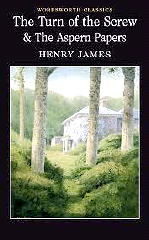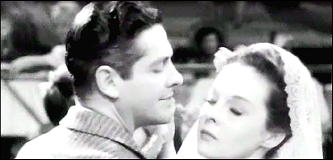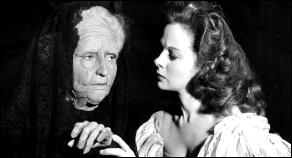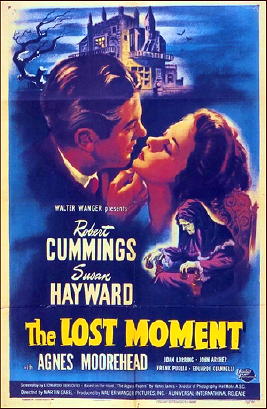Mon 20 Sep 2010
Reviewed by Dan Stumpf: HENRY JAMES – The Aspern Papers / Book & Film: The Lost Moment (1947).
Posted by Steve under Films: Drama/Romance , Reviews[3] Comments
HENRY JAMES – The Aspern Papers. Macmillan, hardcover, US/UK, 1888. First published in three parts in The Atlantic Monthly, March-May 1888. Reprinted many times since.

Filmed as The Lost Moment: Universal Pictures, 1947. Robert Cummings, Susan Hayward, Agnes Moorehead, Joan Lorring, Eduardo Ciannelli, John Archer. Screenplay: Leonardo Bercovici. Director: Martin Gabel.
Well I got around to Henry James again and landed on his 1888 novella The Aspern Papers, probably his most accessible work except for Turn of the Screw. Which ain’t saying a whole hell of a lot, because James never uses one word where he can put twenty, and his notion of objectivity is to invariably leave his characters disappointed.
Yet there is, withal, an easy grace in his prolix prose and a muted yearning in his plots that keeps me coming back. James’ characters long for the heroism their author denies them, a theme that doesn’t appear this consistently again in American Lit until David Goodis, and maybe it’s this that keeps drawing me back.
Whatever the case, Aspern, as I say is a bit more engaging than most James, with something like a real plot, about a publisher/literary enthusiast looking for material relating to a romantic poet who died in the last century.
It seems that a young woman with whom the poet had an affair still lives, incredibly old now, in a decaying mansion in Venice with her niece, and she may have love letters from her legendary paramour. In short order the poetry sleuth inveigles himself into the house, only to find he has entered their lives as well.

It’s a fine, romantic premise for a book, and James handles it competently, with a realism in his characters that threatens at times to bleach all the excitement from the idea, but manages to keep it alive somewhere just under the surface of his inhibitions. The conclusion is typical of James as well: disappointing and yet somehow satisfying in its context.
Universal studios, home of Abbott and Costello and the Wolfman, brought this to the screen in 1947. Or at least they brought the premise; James’ placid plot and wan protagonists are replaced in The Lost Moment by a noirish romanticism the author would hardly have recognized.

The pusillanimous publisher is portrayed by an earnest Bob Cummings, and the reticent niece by sultry Susan Hayward, who seethes with pent-up passion even at her most spinsterish. A kindly dowager who sets the plot in motion on the first page becomes a venal painter with plans of his own (played by John Archer in a Melvyn Douglasmode) and the aged muse/lover of the dead poet is portrayed by a rasping Agnes Moorehead — at least they say it’s Agnes Moorehead; under all those veils and wrinkled makeup it could be Lon Chaney Jr for all I know.
All this could easily have led to a massive betrayal of James’ novel, but it’s saved by a literate script by Leonardo Bercovici (a subsequently-blacklisted author who worked on off-beat romances like Portrait of Jennie and The Bishop’s Wife) and lush, romantic direction by Martin Gabel, of all people.
Gabel always played it cold and constipated in the movies, and his work here as a smooth, moody auteur in the style of Max Ophuls is one of those minor miracles with which the cinema is occasionally blessed.

September 20th, 2010 at 10:32 pm
James is one of those writers that is famous for being difficult and yet can be compelling as he is here, in TURN OF THE SCREW and to a lesser extent PRINCESS CARRISIMA which deals with anarchists (but don’t expect a thriller).
Difficult as James is to read he is worth the effort usually, though the best way to describe him other than Dan’s accurate ‘prolix’ is to say he is leisurely — not a can’t put it down writer, more like a pick it up and read a few pages here and there writer.
I agree about this and the wonderful film, which by all rights should have walked all over James and the story and instead is very good and complimentary to the novella. Dan has nailed both here.
Gabel by the way was a splendid Moriarity in the musical BAKER STREET with Fritz Weaver and Patrick Horgan as Holmes and Watson.
Under the title THE ASPERN PAPERS this was also produced as an opera which played on PBS at least once as part of GREAT PERFORMANCES. I think it was first performed by the Houston Opera Company.
The only other James of interest for ties to genre fiction is probably “The Beast in the Jungle.”
On the other hand James was part of a literary circle in England that included Stephen Crane, Joseph Conrad, Ford Maddox Ford (nee Huffaker), Sir Anthony Hawkins (nee Hope as in THE PRISONER OF ZENDA), and A. E. W. Mason creator of Hanaud and author of THE FOUR FEATHERS and FIRE OVER ENGLAND. Since Conrad and Ford collaborated on one mystery novel, one historical romance, and one science fiction novel and Crane wrote some stories that can only be called westerns and a couple of horror pieces I suppose they all indulged in their own way in genre fiction.
But this is a wonderful film, that manages terrific atmosphere — almost Gothic noir — features some fine performances, and against all the odds compliments it’s source without being the least stately or dull.
And just a word for the sets and cinematography — both are very fine and add to the overall atmosphere of musty finery, decay, and cobwebs thick as old lace.
September 20th, 2010 at 10:40 pm
Actually I’ve always had a strong liking for the work of Henry James especially his novelets. The Aspern Papers I’ve read several times but had somehow missed the film, The Lost Moment. It’s available on vhs for around $20 including shipping but ioffer.com has bootlegs for sale at far lower prices. When I get the dvd I’ll reread the story and then watch the movie, an occupation that never fails to interest me.
September 21st, 2010 at 12:36 am
Walker
I enjoy James too, but not the same way you enjoy escapist fiction. Reading James is pleasurable, but requires the effort that good literature always requires. Reading James is like a fine cognac — an acquired taste, but one hard to deny once acquired.
I think you’ll enjoy the movie. The entire cast is quite good, the atmosphere heady, and Gabel proves an excellent director. It makes some changes from the story, but they are dramatically sound and it’s a satisfying film all around.